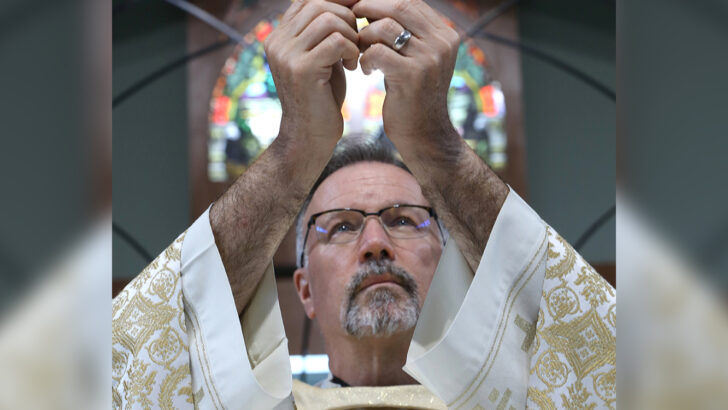The United States is in the midst of a three-year Eucharistic Revival from 2022 to 2025, with four pilgrimage routes from right across the country culminating in a National Eucharistic Congress in mid-July.
One of the inspirations for the Eucharistic Revival was a dispiriting 2019 poll from the highly regarded Pew Research Centre, which found that only about a third of Catholics believed in the real presence of Jesus under the appearance of bread and wine in the Eucharist.
Evidence
Some took it as evidence of the abject failure of the Church to teach one of its most central truths. Some quibbled with the wording of the survey, which used the word ‘actually’ present rather than the real presence. The latter critics suggested that the results might have been less stark if the two survey questions had been worded differently.
Two subsequent surveys, both by Catholic organisations, found better results, but even still, they were interspersed with other disturbing findings
In the post-Covid US Church, only 17% of people attended Mass every week, with a further five per cent watching online”
For example, a report by the Centre for Applied Research in the Apostolate at Georgetown University in 2023 asked Catholics a mixture of open-ended and multiple choice questions but also one final question: “Just to clarify, do you personally believe that after the Consecration during a Catholic Mass, that Jesus Christ is truly present under the appearance of bread and wine upon the altar?” 57% said that they believe Jesus is truly present under the appearance of bread and wine.
This is still pretty bad but regular Mass-goers had much higher levels of belief. Not surprisingly, the authors of the report say that there is considerable confusion among Catholics about the Eucharist.
Some statistics were somewhat lost in the media coverage, such as that in the post-Covid US Church, only 17% of people attended mass every week, with a further five% watching online. Another 18% attended Mass at least once a month.
Presence
The obvious question is if 57% believe in the real presence at Mass, why do they attend so rarely?
In recent times another survey emerged, this time from Vivea, a Baltimore-based company. They re-ran the Pew questions but also added questions which were phrased in more Catholic-friendly ways. They found that 69% of Catholics believed in Church teaching.
Ironically, their more Catholic-friendly phrasing, that is, asking people to agree or disagree with the statement: “Jesus Christ is truly present in the bread and wine of the Eucharist”, is closer to consubstantiation, the doctrine associated with Martin Luther, than transubstantiation, the Thomist understanding of the Eucharist.
Catholics believe, in the words of the Catechism, that “the signs of bread and wine become, in a way surpassing understanding, the Body and Blood of Christ; they continue also to signify the goodness of creation”.
So the Vivea question should probably have read something like: ‘Jesus Christ is truly present under the appearance of the bread and wine of the Eucharist’.
An Iona Institute/Amarach poll in March 2023 found that only 59% of those who used to attend regularly had returned to Mass”
Nit-picking aside, once again, faithful Mass-goers were much more likely to understand the doctrine.
Mass attendance has fallen dramatically in Ireland, particularly since Covid-19. An Iona Institute/Amarach poll in March 2023 found that only 59% of those who used to attend regularly had returned to Mass.
As someone who taught religious education for more than three decades, I can confirm that at least among the middle classes in Dublin, knowledge of the Eucharist is abysmally low. Students come into first year of secondary school having never heard that Jesus is truly present on the altar. Instead, they are told that the Eucharist is holy bread.
Interest
There are a number of related but separate problems here, including a lack of interest, faith and knowledge among parents and teachers alike.
But it fascinates me that among young Irish converts (or reverts, in some cases, as they were reared nominally Catholic but had no real experience of faith) devotion to the Eucharist is central to their lives.
They attend Adoration of the Blessed Eucharist and many try to attend Mass daily. They are a tiny minority, but they understand and appreciate the cosmic significance of what happens at mass.
Perhaps one of the unforeseen effects will be a rising appreciation of what we now complacently take for granted”
Irish people used to risk their lives to attend Mass. So did people in the Soviet Union. For example, US-born Fr Walter Ciszek volunteered to minister behind the Iron Curtain in 1939 and ended up spending 23 years in notorious prisons like Lubianka Prison in Moscow, followed by 15 years hard labour in a Siberian Gulag. He and fellow priests made enormous sacrifices to celebrate the Eucharist.
His courage, and that of our own ancestors, puts our lukewarm faith to shame. As the numbers of priestly vocations continue to fall, perhaps one of the unforeseen effects will be a rising appreciation of what we now complacently take for granted.


 Breda O'Brien
Breda O'Brien A priest raises the Eucharist in this illustration. Photo: OSV News photo/CNS file, Bob Roller
A priest raises the Eucharist in this illustration. Photo: OSV News photo/CNS file, Bob Roller 